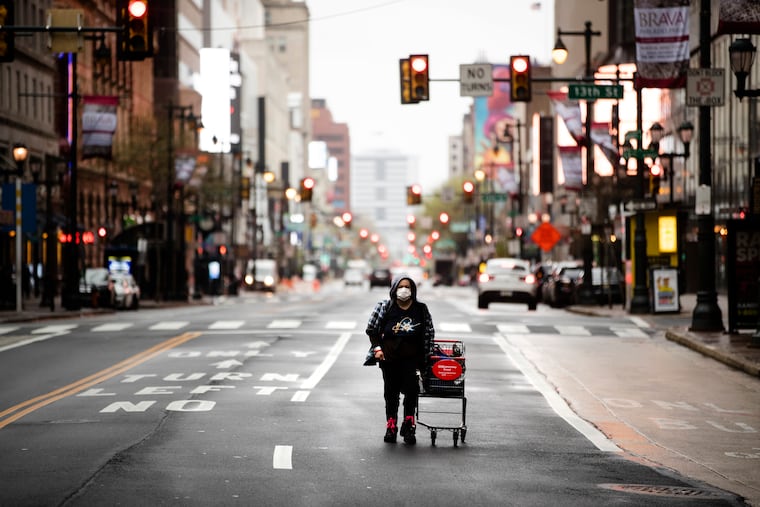The $600 in extra coronavirus unemployment benefits has expired. Here’s what to do now.
The federal program that has delivered an extra $600 in weekly unemployment benefits to millions of Americans has ended. So, what do you do now? Here are some ways you can find support.

The federal program that has delivered an extra $600 in weekly unemployment benefits to millions of Americans ended Friday, and negotiations over extending it have stalled in Washington.
About three million people in Pennsylvania get the checks, which have helped tide a lot of people over during the ongoing coronavirus pandemic and the deepening economic fallout. The last $600 payments in Pennsylvania and New Jersey went out last week.
So, what do you do now? Here are some ways you can find support:
Rent and mortgage help
If you need rent relief because of the pandemic, you can apply for assistance through a program from the Pennsylvania Housing Finance Agency.
If you are applying for rent relief through the PHFA program, you must have become unemployed after March 1 as a result of the pandemic. Those who can demonstrate a drop in their annual income of at least 30% due to the pandemic can also qualify.
If you qualify for rent assistance, you can get up to $750 a month in relief for a maximum of six months, for rent due between March 1 and Nov. 30 — up to $4,500 in assistance. The money goes directly to landlords, not to renters.
Homeowners who are eligible can get up to $1,000 a month in assistance for up to six months for mortgage payments owed between March and December. Just like the rent program, the money goes straight to the mortgage lenders, not to the homeowner.
Applications close Sept. 30. If you have questions about the program and your eligibility, you can reach the PHFA at 855-827-3466 weekdays from 8 a.m. to 5 p.m.
In addition, the Pennsylvania Department of Human Services offers rental assistance, bridge housing, emergency housing, and more support through its Homeless Assistance Program. HAP benefits go up to $1,500 for a family with children, and $1,000 for an individual.
» READ MORE: You can apply for mortgage and rent assistance in Pennsylvania right now. Here’s how.
Food assistance
Here are some area food banks where you can get help. It’s a good idea to visit their websites and/or social media pages for updated information.
Philabundance serves about 350 local pantries in nine counties, five in Southeastern Pennsylvania and four in South Jersey. (Those counties are Bucks, Chester, Delaware, Montgomery, and Philadelphia in Pennsylvania, and Burlington, Camden, Gloucester, and Salem in New Jersey.) Just type in your zip code and see which food pantry is closest to you.
The City of Philadelphia has a list of where to find free food during the COVID-19 crisis here.
There are also sites where families can pick up meals for children at locations across the city. All children are eligible and no ID is required. Find a meal site near you. To find a lunch site near you, text “FOOD” or “COMIDA” to 877-877.
Additional meals for children can also be found at the Coalition Against Hunger.
In New Jersey, here are some resources:
Food Bank of South Jersey. This food bank supplies approximately 190 food pantries in Camden, Burlington, Gloucester, and Salem Counties.
Community Food Bank of New Jersey (Southern Branch). Located in Egg Harbor Township, this branch covers Atlantic, Cape May, and Cumberland Counties.
» READ MORE: Where to find free food right now if you need it
Help with bills
In Philadelphia, there is the Utility Emergency Services Fund. UESF provides assistance to families facing utility terminations or are already shut off. In addition to help with utility payments, the program also offers help with rent, security deposits, and mortgage payments.
The Philadelphia Water Department also offers a low-income assistance program with payments based on household income, not water usage, making monthly bills more affordable and consistent. For more information, call the Water Department at 215-685-6300.
PECO has also suspended nonpayment service disconnections and waived new late fees, as well as offering payment options and financial assistance to help pay down existing bills.
If you have a past-due bill, you may also be eligible for up to $800 through LIHEAP’s (Low Income Home Energy Assistance Program) Recovery Crisis Program, which is open to renters and homeowners through Aug. 31. Any assistance does not have to be repaid.
» READ MORE: Federal, state and city programs that can help you if you’ve been affected by the pandemic
Help for families
In Philly, the city is offering support for pregnant women, toddlers, and babies, with free food and diapers at more than 10 sites across the city.
In New Jersey, the WIC program helps pregnant women or parents with kids who are 5 and under. For information on how to get that support, check the website.
» READ MORE: Philly is offering free meals for seniors and free diapers for babies. Here’s how to get them.
Mental health help
There are many places that are offering free or low-cost support right now, including counseling, grief support, substance use issues and more. And you don’t have to leave your house to use it.
Here’s a list of resources around the region.
» READ MORE: Where to find free and low-cost therapy and support right now
Help looking for a job
Here is a list of companies in Philly that are currently hiring.
The Philadelphia Inquirer is one of more than 20 news organizations producing Broke in Philly, a collaborative reporting project on solutions to poverty and the city’s push toward economic justice. See all of our reporting at brokeinphilly.org.